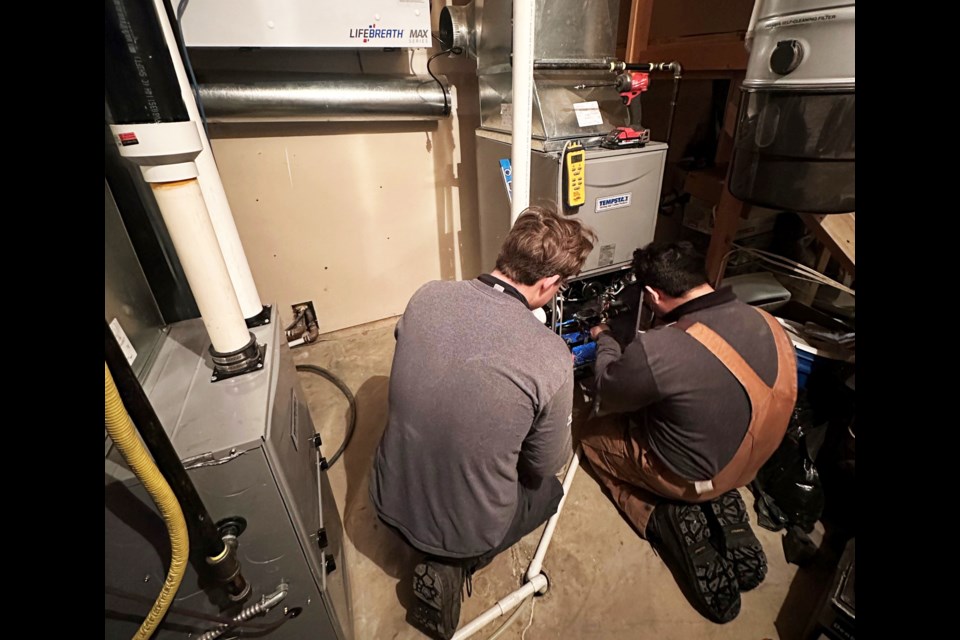As part of its zero-emission space and water heating mandate, the B.C. government is asking natural gas, electrical and lighting contractors for feedback on a proposed ban on the use of conventional gas equipment for residential, commercial and institutional buildings.
The new rules, to take effect provincewide Jan. 1, 2030, would prohibit the sale and installation of gas water heaters and would also ban new gas furnaces and gas boilers unless either is installed as part of a hybrid dual fuel system (electric or gas heat pumps integrated with conventional gas combustion appliances).
The government’s initiative is developing a policy to implement the Highest Efficiency Equipment Standard (HEES) commitment, which identifies high-efficiency, low-carbon appliances such as electric baseboard heaters, electric furnaces, electric heat pumps, gas heat pumps or hybrid dual fuel systems as the accepted heating appliances for existing buildings and new construction in B.C., starting in six years.
According to an information sheet released by CleanBC on Dec. 22:
“Space and water heating are the primary drivers of GHG emissions from buildings. To meet our targets, we need to ensure these functions are super-efficient, improve resilience and, wherever possible, run on clean electricity or other renewable fuels. To help accelerate this transition, we're committing to highest-efficiency standards for new space and water heating equipment by 2030, and earlier where feasible.
“After 2030, all new space and water heating equipment sold and installed in B.C. will be at least 100 per cent efficient, significantly reducing emissions compared to current combustion technology. Electric resistance technologies like baseboard and electric water heaters are 100 per cent efficient: they convert all the energy they use into heat. But heat pump technologies exceed 100 per cent efficiency by capturing and moving ambient heat, without having to produce it. The new requirements will encourage more people to install electric heat pumps while continuing to allow the use of electric resistance technologies. They will also allow hybrid electric heat pump gas systems and high-efficiency gas heat pumps.”
Preliminary policy development came after a cost-benefit and market readiness assessment of compliant equipment was conducted by the Ministry of Energy, Mines and Low-Carbon Innovation, based on modelling of climate policies and targets, technology adoption, energy use, market trends.
Stakeholder consultation on the proposed energy-efficiency standards began with an Indigenous engagement session this week and will continue through Feb. 14.
The first general information session geared to contractors is scheduled for Thursday from 2-3:30 p.m., with another set for Feb. 6 from 10:30-noon.
If the ban on new standalone fossil fuel heating appliances is adopted provincewide in B.C., as it was in Quebec as of Jan. 1, Prince George plumbing/heating/air conditioning contractor Al Russell foresees panic buying from consumers scrambling to replace their older gas furnaces and water heaters before the 2030 deadline.
He says the province does not have enough electricity-generating capacity and the infrastructure that delivers hydro power is not sufficient to carry the increased loads electric heat appliances and electric vehicles will demand to replace the heat generated from natural gas usage.
“Where are we getting this power from and how are we getting it there,” Russell said. “The wires on the (BC Hydro) poles would have to get three-times as big and the transformers they would need are a limited commodity. When are they starting that and how much is it going to cost?”
The recent cold snap that raised demand for electricity to record levels two weeks ago in Alberta prompted an emergency alert for customers to reduce usage and Russell said that should serve as warning cry for British Columbians that it could happen here if demand for power keeps increasing with the province’s push to electrify.
“This change is only six years away and if they get that ship pointed in that direction you won’t stop it, they’ll keep on bulldozing it right through,” said Russell.



